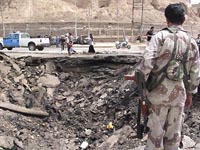Al-Qaida-linked group claims responsibility for last week attack in Kirkuk
An al-Qaida-linked group said it was responsible for a series of attacks launched in northern Iraq, including a suicide bombing attack that had killed six people and wounded a top Kurdish policeman in the city of Kirkuk.

In claims of responsibility posted on militant Internet sites Sunday and Monday, Ansar al-Sunnah said it also was behind attacks in the cities of Tikrit and Mosul north of Baghdad.
The claims coincided with comments made Monday by a senior U.S. commander that northern Iraq has become more violent than other regions in Iraq as al-Qaida and other militant groups move there to avoid coalition operations elsewhere.
Army Maj. Gen. Mark P. Hertling, the U.S. commander in northern Iraq, told Pentagon reporters that al-Qaida cells still operate in all the key cities in northern Iraq. Militants have been pushed east to his area from Anbar after local tribes have allied with U.S. forces against al-Qaida, he said. Others have been pushed north from the Baghdad region, where this year's U.S. troops escalation has made more operations possible, he said.
The U.S. military says overall attacks in Iraq have fallen 55 percent since nearly 30,000 additional American troops arrived in Iraq by June, and some areas are experiencing their lowest levels of violence since the summer of 2005.
Ansar al-Sunnah identified the Kurdish policeman in Kirkuk as Brig. Gen. Khattab Omar, saying he was the commander of the police's "Quick Response Force" in the city.
It said eight of his guards were killed in the suicide car bombing.
Police in Kirkuk, 290 kilometers (180 miles) north of Baghdad, have said a suicide bomber rammed his car into a police patrol Nov. 15, killing six people and wounding more than 20 - many of them children walking to school. They said the bomber's apparent target was Omar's six-car convoy. Three of the commander's officers were killed, along with three civilians, they said, but the commander survived with serious injuries to his chest and head.
Kirkuk has been seeing a spike in violence in recent weeks as tensions rise between the city's Kurdish, Arab and Turkomen communities ahead of a possible referendum to decide the fate of the region. Iraq's Kurds claim the city as their own and want to annex it to their self-rule region, but Kikruk's Arab and Turkomen - ethnic Turks - dispute the Kurdish claim.
In another attack in Tikrit, Ansar al-Sunnah said it had used a "unique and unparalleled" technique when it bombed a police station Sunday by using a roadside bomb buried in a fake device. It gave no further details, but police in the city said a policeman was killed and two others, including a lieutenant colonel, when they tried to defuse a roadside bomb they took inside the city's police forensic laboratory after retrieving it from the street outside.
In other claims, the militant group said it tried but failed to kill with a roadside bomb an Iraqi officer working at the joint U.S.-Iraqi command in Tikrit. It did not say when the attack took place or give casualty figures, saying only that while the target escaped, the explosion filled "soldiers of evil" with horror and fear.
In Mosul, it said its fighters on Nov. 4 attacked the headquarters of the city's "Awakening Council" - the name given to the command of tribal forces which joined the U.S. and Iraqi forces in the fight against al-Qaida. It gave no details.
Subscribe to Pravda.Ru Telegram channel, Facebook, RSS!


